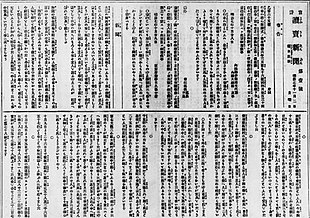Portal:Conservatism
| Main page | Showcase | Project |
Introduction
Conservatism is a cultural, social, and political philosophy and ideology that seeks to promote and preserve traditional institutions, customs, and values. The central tenets of conservatism may vary in relation to the culture and civilization in which it appears. In Western culture, depending on the particular nation, conservatives seek to promote and preserve a range of institutions, such as the nuclear family, organized religion, the military, the nation-state, property rights, rule of law, aristocracy, and monarchy. Conservatives tend to favor institutions and practices that enhance social order and historical continuity.
The 18th-century Anglo-Irish statesman Edmund Burke, who opposed the French Revolution but supported the American Revolution, is credited as one of the forefathers of conservative thought in the 1790s along with Savoyard statesman Joseph de Maistre. The first established use of the term in a political context originated in 1818 with François-René de Chateaubriand during the period of Bourbon Restoration that sought to roll back the policies of the French Revolution and establish social order.
Conservatism has varied considerably as it has adapted itself to existing traditions and national cultures. Thus, conservatives from different parts of the world, each upholding their respective traditions, may disagree on a wide range of issues. One of the three major ideologies along with liberalism and socialism, conservatism is the dominant ideology in many nations across the world, including Hungary, India, Iran, Israel, Italy, Japan, Poland, Russia, Singapore, and South Korea. Historically associated with right-wing politics, the term has been used to describe a wide range of views. Conservatism may be either libertarian or authoritarian, populist or elitist, progressive or reactionary, moderate or extreme. (Full article...)
Selected article
The Daily Mail is a British, daily middle market tabloid newspaper owned by the Daily Mail and General Trust. First published in 1896 by Lord Northcliffe, it is the United Kingdom's second biggest-selling daily newspaper after The Sun. The Daily Mail was Britain's first daily newspaper aimed at the newly-literate "lower-middle class market resulting from mass education, combining a low retail price with plenty of competitions, prizes and promotional gimmicks", and the first British paper to sell a million copies a day. It was, from the outset, a newspaper for women, being the first to provide features especially for them, and is still the only British newspaper whose readership is more than 50% female. In the late 1960s, the paper went through a phase of being liberal on social issues like corporal punishment, but soon returned to its traditional conservative line.
Selected quote
The real division is not between conservatives and revolutionaries but between authoritarians and libertarians.
— George Orwell, in a letter to Malcolm Muggeridge (4 December 1948)
Selected image
The Yomiuri Shimbun is a Japanese newspaper published in Tokyo, Osaka, Fukuoka, and other major Japanese cities. It is one of the five national newspapers in Japan; the other four are the Asahi Shimbun, the Mainichi Shimbun, Nihon Keizai Shimbun, and the Sankei Shimbun. The headquarters is located in Otemachi, Chiyoda, Tokyo. Founded in 1874, the Yomiuri Shimbun is credited with having the largest newspaper circulation in the world having a combined morning and evening circulation of 14,323,781 through January 2002. The Yomiuri Shimbun is conservative and sometimes considered a centre-right newspaper.
Credit: Akira
Did you know...
- ... that California began celebrating Ronald Reagan Day on February 6, 2011, which would have been Reagan's 100th birthday?
- ...that in Edward Heath's 1968 Declaration of Perth, he pledged the Conservative Party's support for Scottish devolution, a policy later reversed by Margaret Thatcher?
- ... that Helen Grant became the first black female candidate to be elected as a Conservative member of Parliament?
Selected anniversaries in December
- 1860 – the Reform War ends with the surrender of conservative General Miguel Miramón outside of Mexico City
- 1937 – a bipartisan coalition releases the "Conservative Manifesto" which was critical of President Franklin Roosevelt's New Deal policies.
- 2003 – the Conservative Party of Canada is formed
- 1834 – Sir Robert Peel publishes the Tamworth Manifesto which lays the foundation for the modern British Conservative Party.
Topics
Associated Wikimedia
The following Wikimedia Foundation sister projects provide more on this subject:
-
Commons
Free media repository -
Wikibooks
Free textbooks and manuals -
Wikidata
Free knowledge base -
Wikinews
Free-content news -
Wikiquote
Collection of quotations -
Wikisource
Free-content library -
Wikiversity
Free learning tools -
Wiktionary
Dictionary and thesaurus









